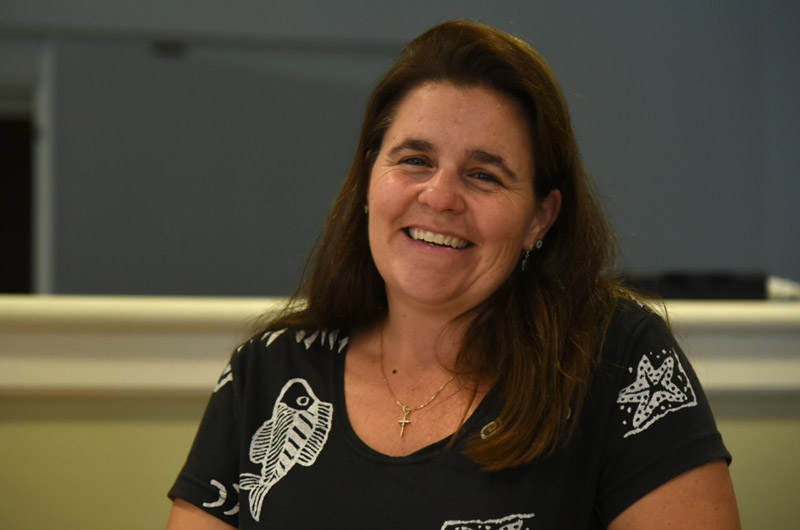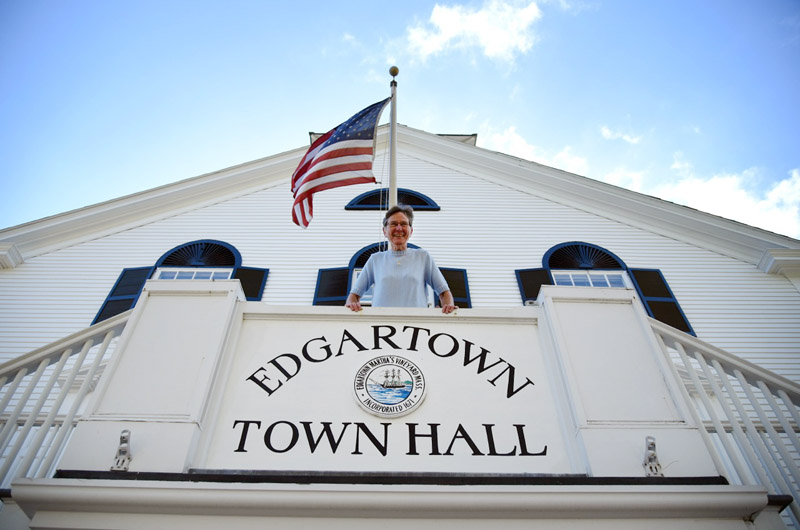For the first time this year, voters on Martha’s Vineyard and across the state can choose to cast their ballots up to two weeks prior to election day on Nov. 8. The new procedures, as required by state law, aim to increase voter turnout and help alleviate long lines at polling stations.
“It’s going to be like a mini election,” said Oak Bluffs town clerk Laura Johnston, who along with other town clerks has been preparing for the changes this year. The early ballots will be sealed and later added to the others on election day. Each town will follow the same basic procedures, although the state allows for broad discretion in terms of hours and locations. The early voting window is from Oct. 24 to Nov. 4.
Oak Bluffs administrators plan to distribute pamphlets and reach out to voters at the Windemere nursing home, among other preparations. “We’ve never done it, so we don’t know whether we’ll have lines around the building Monday through Friday for those two weeks, or if we will get 20 people,” Ms. Johnston said. “But the more we put the word out there, I think the better response we’ll have.”
Town clerks expect a high voter turnout this year, as is often the case during presidential elections. The number of registered voters in Dukes County has grown steadily, from 12,503 in 2006 to 14,644 as of August. If the primaries in March were any indication, Island election officials may have their hands full in November.
Chilmark town clerk Jennifer Christy said general elections in her town usually draw 60 to 70 per cent of voters to the polls. Only about 30 per cent turned out for the September state primary, she added. “But that’s high for primaries in general.”
Ms. Johnston also reported about a 30 per cent turnout at the primary last month, calling it high. “In all the years I’ve been here, I’ve never seen such a high turnout for a primary,” she said, adding: “We always have a huge presidential election turnout.”
Town clerks across the Island note an uptick in voter registrations this year, along with a steady flow of absentee ballots beginning this week. Tisbury town clerk Hillary Conklin reported mailing about 100 absentee ballots as of Wednesday, which she said marked an increase over last year, especially among overseas residents who haven’t voted in several years. Edgartown town clerk Wanda Williams has mailed about 40 ballots so far, which she also said marked an increase. Town clerks in Oak Bluffs, West Tisbury and Chilmark each reported preparing more than 100 absentee ballots this week.
But while absentee ballots are available only to voters who are away from their town of residence, disabled or have a religious conflict with the scheduled day of voting, early voting is open to all registered voters with no explanations needed.
Pam Wilmot, director of Common Cause Massachusetts, which has long advocated for early voting and other election reforms in the state, noted that absentee voting excludes people who are sick or have to work on polling days. Speaking to the Gazette this week, she said the early voting provision was one way of getting around state restrictions on absentee voting.
“I think it is one of the ways that Massachusetts has been significantly behind the rest of the country in providing choices for voters and modernizing elections,” she said, adding that 36 states had already adopted early voting. (In 2011, the voting advocacy group Rock the Vote ranked Massachusetts 42nd in the country for voting and registration services, along with preparation efforts such as high school civics courses.)

Early voting is just one element of a comprehensive election reform bill that former Gov. Deval Patrick signed into law in 2014, although it may have the most widespread effect, since all registered voters qualify. The law also allows for online voter registration and pre-registration for 16 and 17-year-olds, and requires that three per cent of all precincts undergo audits of their election equipment after polls close in election years. It also sets up an election laws task force to review the early voting process and explore additional measures such as same-day voter registration.
Most of the provisions go into effect this year, although the state began offering online registration in 2015. Some Island towns have already preregistered small numbers of teenagers who will automatically be added to the voting list when they turn 18.
Ms. Wilmot believed early voting as outlined in the law too closely resembled absentee voting, with special ballots that are held and counted later. “It will make the whole process more cumbersome and longer,” she said. “But some lawmakers felt it would be more familiar to election officials and so it would be an easier entry into this arena.” Along with advocating for no-excuse absentee voting, she envisions an early voting procedure that requires simply showing up and casting a ballot.
The law itself saw some opposition related to potential costs to towns and cities, Ms. Wilmot said, but passed by a landslide 142-10 vote in the house, followed by unanimous approval in the senate. The law was written to go into effect this year, which Ms. Wilmot also saw as a mistake, since there is more to lose in a general election and problems may arise. But she said the goal was to demonstrate the benefit in contrast to those four years ago, when voters in some cities waited hours to cast their ballots. “Early voting will directly impact that issue because you get your high frequency voters out of the way at the beginning,” she said.
Brian McNiff, spokesman for the Office of the Secretary of the Commonwealth, which oversees elections and voting in the state, said the two-year delay was meant to give communities time to prepare for the new procedures, although he said there was no way to know just how many people might end up voting early.
Some off-Island towns plan to keep early-voting stations open well into the evening and on weekends, and larger cities will have multiple polling locations. Island towns will offer daytime hours at single locations, although Edgartown plans to offer early voting on Saturday, Oct. 29, as well. “I checked with all the other clerks on the Island, and we decided that since we were such a small community in each town, our voters could probably fit it into the two-week period,” Ms. Williams said.
West Tisbury town clerk Tara Whiting anticipates greater participation among people who travel in the off-season but may still be on the Island during the early voting window. In preparing for the changes this fall, she has been asking residents if early voting might be a better option than absentee ballots. But she doesn’t expect any administrative challenges, in part because she plans to be on hand the entire time.
“I think it will be interesting to see how much of a push there is publicity-wise,” Ms. Whiting said. “On the other hand, I have a contingent that really likes to go to the polls. They find it very important. So I don’t know how many will actually take advantage of it.” At the same time, she doesn’t foresee a major drop in absentee ballots, since many part-time voting residents have already left for the winter.
Ms. Wilmot said the additional costs would likely range from almost nothing in small towns using their own facilities and staff to somewhere in the tens of thousands in larger communities with multiple sites and longer hours.
One study in the American Journal of Political Science in 2014 argued that early voting on its own actually decreases voter turnout, since services and incentives such as media coverage, free rides, and social expectations often coincide with traditional election days but may become diluted in the longer early voting period.
“Early voting is a convenience to dedicated voters but it does not solve the problem of getting additional people to cast ballots,” according to a summary by co-author Barry Burden. But turnout may increase when early voting is combined with onsite voter registration, he added.
Ms. Wilmot expects early voting in Massachusetts to have the greatest effect in larger communities that have experienced long lines on election day. And she noted a “demonstrable effect” of early voting in lower-income communities where people tend to work elsewhere and voting is more of a burden. “When early voting has been scaled back, it definitely has impacted low-income and minority communities,” she said.
Ms. Wilmot said she expects about 15 per cent of voters statewide to take advantage of the option this year, with another 15 per cent filling out absentee ballots. “I do think it is an election people will want to participate in, even if they don’t necessarily like either of the top candidates,” she said with a nervous laugh. “This is an important election.”
Ms. Conklin said the state had predicted a possible turnout of 800 early voters in Tisbury, but she couldn’t guess exactly what conditions would bring them out, and who might benefit the most. “I’m waiting to see myself,” she said.








Comments
Comment policy »